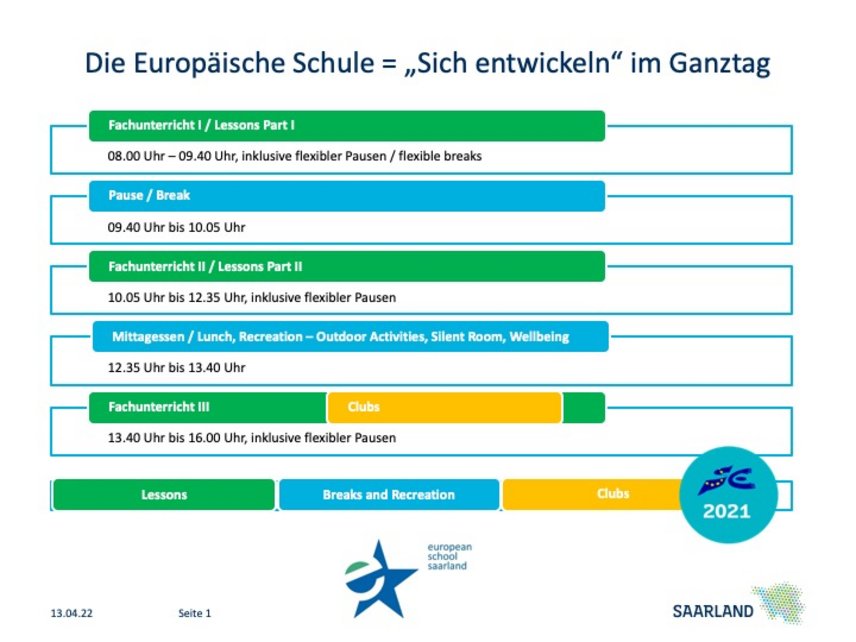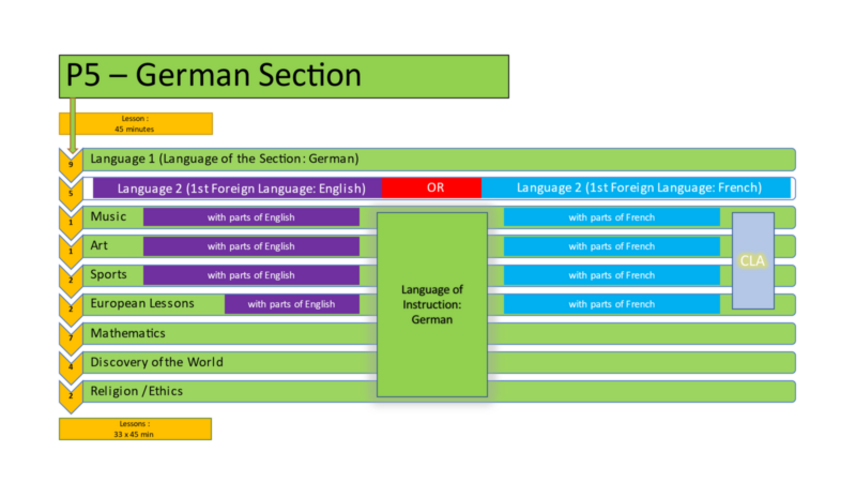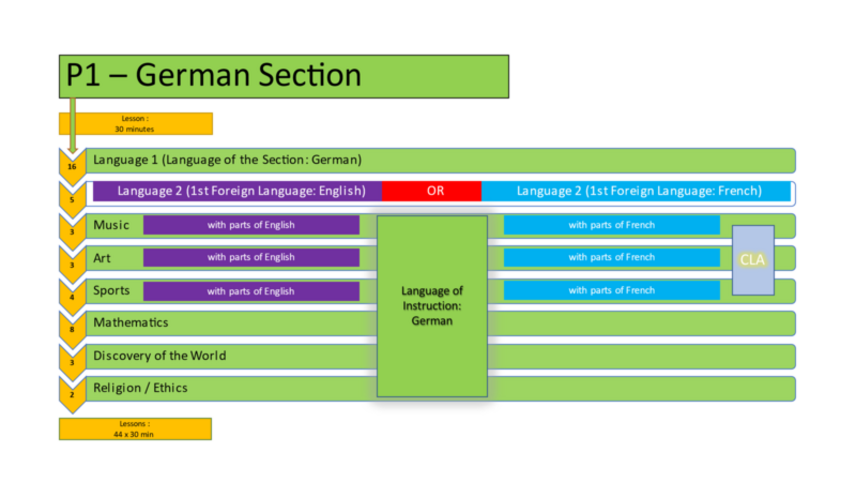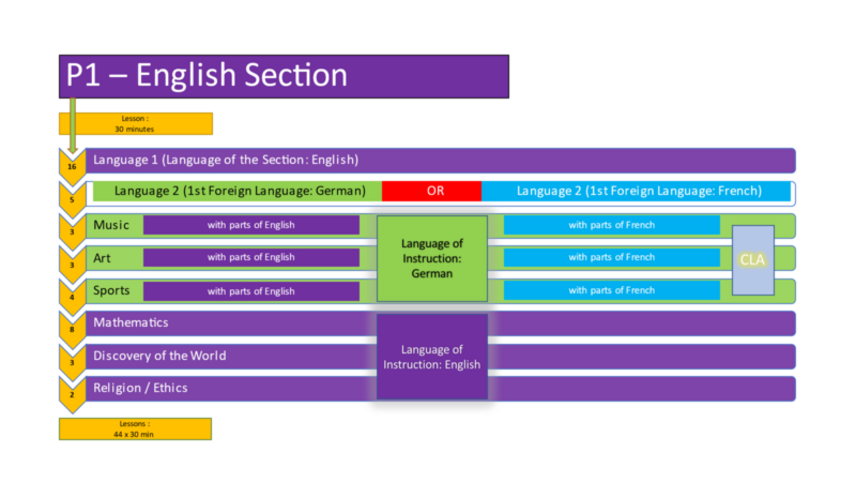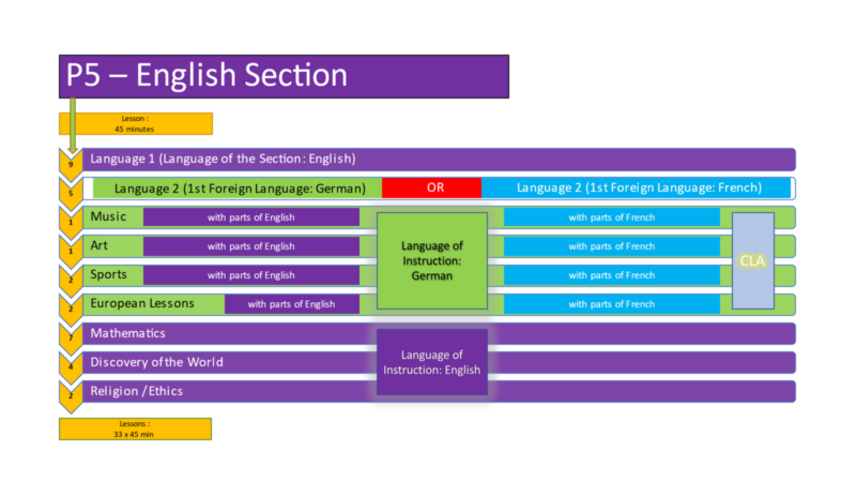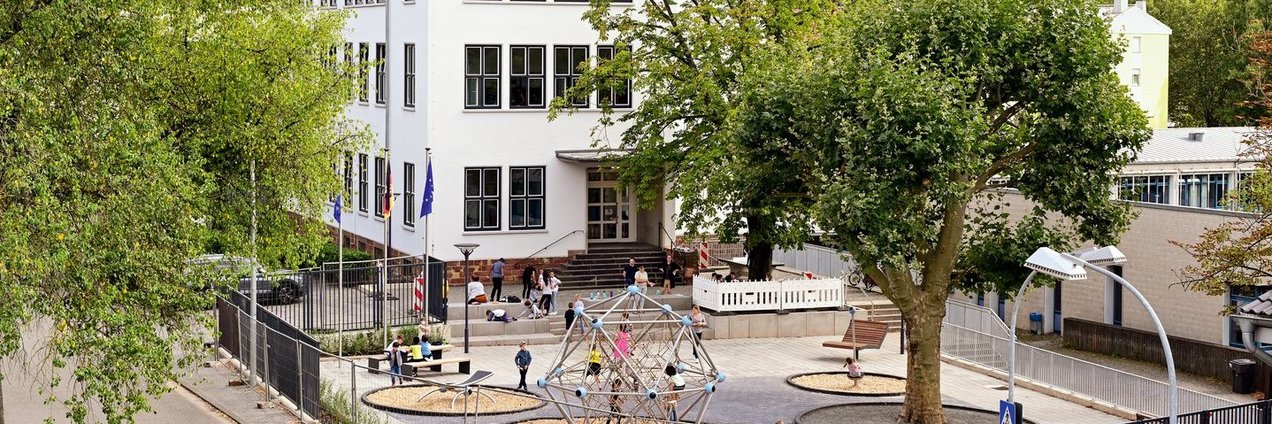
- » Seite vorlesen
- » Seite drucken
European School Saarland
The European School Saarland is part of the well-known system of European Schools represented throughout Europe. Originally founded in the 1950s to provide an excellent school education for the children of the members of the European Commission, the concept has continuously evolved and has now established itself as one of the world's leading school systems.
The European school system is divided into a five-year primary level and a seven-year secondary level. Schooling leads to the European Baccalaureate, a qualification recognized as an entrance qualification to university and higher education in all member states and highly regarded internationally.
As a public school, the European School is open to all interested parents and their children. It will start in the school year 2021/2022 with students in grades 1 and 5 and will grow up in the following years. Our qualified staff will support and accompany your child from the moment they enter the European School. In this establishing phase of the school, the value of a spirit of “we” and connectedness takes on special importance, and so everyone becomes an actor in shaping and forming the unique identity of this new school community.
Registration period
Registrations in the German and English sections of P1, P2 (from SJ 22/23), P5 and S1 (from SJ 22/23) can only be made outside the official registration periods after personal consultation. Of course, if you have just moved to Saarland or are planning to move here, you are welcome to contact us directly.
We would be happy to visit you!
The ESS team around Hubert Jung will be happy to come to your business enterprise, your company or your higher education institution to present the European School system and its quality features to your employees. We will also be happy to present the advantages of our European school system to you in an online event. Please get in touch with us!
Our Objectives
We want to teach your children in a holistic spirit and enable them to form their own cultural identity while confidently entering a community of cultural diversity.
Against the background of our pedagogical profile, our goals include above all,
- to sustainably promote the children's strengths based on a broad range of subjects and thus provide them with a solid school education to lay a valuable foundation for the following stages of education and training after attending the European School.
- to promote the multilingual skills of the children, thereby enabling them to engage in culturally connected exchanges at a high level in both their native and foreign languages. to complement integral learning with digital learning systems and approaches in a multimedia learning environment, developing and promoting children's digital literacy.
- to provide children with competences in dealing with all areas of information technology by offering a broad range of information technology education.
- to encourage a European and global attitude of values through the study of the human sciences in particular.
- in addition to promoting mathematics and science education, to awaken and encourage the children's individual creativity in music-related subjects.
- to develop and promote athletic skills, while instilling in children the joy of holistic, healthy living.
- to exemplify core values of tolerance, communication, and cooperation and to reinforce the children’s distinctiveness as part of a functioning community.
Pedagogical Profile
The students at the European School learn together in an all-day program from 8:00 a.m. to 4:00 p.m. five days a week.
The pedagogical profile of the European School is characterized by a commitment to provide multilingual and multicultural students with a high-quality education from the first grade to the Baccalaureate. Focal points are among others:
- multilingualism
- mathematical and scientific education
- informatic education and learning with ddigital media
- music, cultural and sports education
- European education
- democracy education
- vocational orientation
All-day school
The daily routine at the European School is characterized by the alternation of subject lessons, individual learning time and free time, with the aim of finding a balance between work and relaxation and recreation phases for each student.
Teaching time: Classes begin at 8:00 a.m. and end at 4:00 p.m. The all-day school offers three teaching blocks, which include flexible breaks, individual learning time and free time between 3:10 p.m. and 4:00 pm.
The leisure activities offered are part of the compulsory elective area. Students can choose from a range of activities, including sports, art, culture, music, digitalization and media. In addition to the subject lessons, the schedule includes remedial lessons, which can be flexibly integrated into both learning and leisure time. Besides there are class council, project and method lessons and the European lessons, which correspond to the special idea of multilingual and multicultural European education of the European School Saarland.
The school's own cafeteria offers a daily lunch for which a fee is charged.
Multilingualism and Language Sections
- The European School is divided into a German and an English language section. In the German and English language section German or English is the predominant language of instruction. Thus, for English speaking children, the mother tongue remains their first language throughout their school years.
- Children whose native language is neither German nor English are assigned to a section according to their dominant language.
- When the child starts school in grade 1 (P1), lessons in the first foreign language, e.g. French or German, begin.
- From the sixth grade (S1), children learn a second foreign language (L2) before a third European language of the member states of the European Union can be taken in the ninth grade (S4). From the eleventh grade (S6), another foreign language can be learned.
- Not only are individual subjects at the primary level (music, art, and sports) taught multilingually and follow a multilingual approach but designated European lessons from grade 3 onward bring children from the two language sections together for games, cultural and artistic activities and projects.
- The European School’s multilingualism strategy provides for individual support for students who only attend the school from grade 5 onwards or students joining the school community at other times.
- During the gradual development of the school, students from internationally mobile families can be admitted to any grade level and receive individual language support.
German Section of the first and fifth grades (P1 / P5)
P1 - German Section
In this section of grade 1, German is the predominant language of instruction: Mathematics, Discovery of the World and religion/ethics are taught in German. The subjects of music, art and sports are the focus of the Content and Language Area (CLA). In this multilingual area, content can be taught in cross-sectional groups in the basic language German with portions of the first foreign language English and French. The multilingual approach is of special importance here due to the particularly student-oriented subject areas.
P5 - German Section
In the German section of grade 5, German continues to be the basic language of instruction. Mathematics, Discovery of the World and religion/ethics are taught in German, while music, art, sports and the European Lessons are taught multilingually in the Content and Language Area (CLA). Thus – as in the entire school period in the European School Saarland – the special idea of multilingualism and multiculturalism in the European and international sense continues to be of central importance.
English Section of the first and fifth grades (P1 / P5)
P1 - English Section
In this section of grade 1, English is the predominant language of instruction: In addition to English classes, mathematics, Discovery of the World and religion/ethics are taught in English. The subjects of music, art and sports are the focus of the Content and Language Area (CLA). In this multilingual area, content can be taught in cross-sectional groups in the basic language of German with portions of English and French. The multilingual approach is of special importance here due to the particularly student-oriented subject areas.
P5 - English Section
In the English section of grade 5, English continues to be the basic language of instruction. Mathematics, Discovery of the World, religion/ethics are taught in English, while music, art, sports and the European Lessons are taught multilingually in the Content and Language Area (CLA). Thus – as in the entire school period in the European School Saarland – the special idea of multilingualism and multiculturalism in the European and international sense continues to be of central importance.
School-leaving Qualifications and School Entrance
At the end of the twelfth year, the students take the centrally organized European Baccalaureate examination. The European Baccalaureate is accepted internationally as a means of access to higher education. In addition to the European Baccalaureate, students can also leave the school with alternative school-leaving qualifications at earlier dates.
Students may also be admitted to the school during the current school year, once the year groups have been established.
A transfer from Saarland schools to the Upper School of the European School Saarland is possible in principle. A transfer from the European School Saarland to a Saarland school – also to the Upper School – is also possible in principle.
Particularly in the case of highly mobile families, the ability to connect to other European Schools is a given when changing schools.
